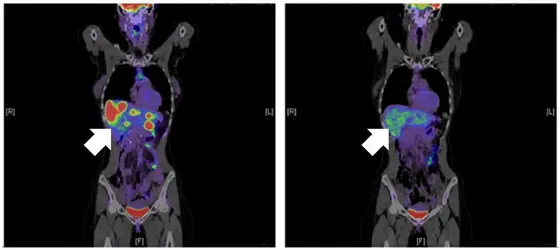The life expectancy of patients with non-operable metastasized colorectal cancer is about 24 months. In an advanced stage only few treatment options remain. Immunotherapeutic approaches have been fairly unsuccessful so far, although the necessary immune cells and their signaling molecules can been found around the cancer cells. Current immunotherapies are aimed at strengthening the acquired immune response, specifically activating T-cells against the tumor cells. The scientists from Heidelberg and Hannover have now also managed to mobilize the innate part of the immune system by re-activation.
To do this, they closely examined the immune cells, particularly the macrophages from the tissue surrounding liver metastases of colorectal cancer patients. “Originally, it was assumed that the immune defense within the metastases also had an effectiveness against the tumor“, explains Dr. Niels Halama, physician and scientist at the Medical Oncology department at the NCT. “We can now show that in colorectal cancer patients, the metastases manipulate the macrophages around them in a way that promotes cancer growth instead of fighting it." The signal protein CCL5, which is normally involved in inflammatory process regulation as it pulls immune cells into the affected tissue, plays a major part. High concentrations of CCL5 are found in conditions such as rheumatoid arthritis, multiple sclerosis and Morbus Hodgkin. High concentrations of CCL5 and associated tumor-promoting effects have also been found in breast cancer metastases.
The scientists have shown that the T-cells close to the liver metastasis produce CCL5. In order for the protein to work, it needs to bind to its counterpart, the CCR5 receptor. This receptor is present on the cell surface of tumor cells and macrophages and induces upon activation tumor-promoting effects. The CCR5 receptor is already well known from research into HIV, because the HI virus also binds to CCR5 and penetrates the cells this way. An already registered drug blocks the surface protein CCR5 and is used therapeutically for HIV patients.
The scientists investigated the effectiveness of this HIV drug, initially in pre-clinical trials on liver metastases. The CCR5 blockage reversed the tumor-promoting effects of the macrophage in the tissue surrounding the metastasis and showed a repolarization with anti-tumoral effects. The re-programmed scavenger cells were able to destroy the cancer cells, sparing the healthy liver tissue. “The trials have improved our understanding of immune regulation in cancer. It appears that the CCL5-CCR5 axis is important for the activation of macrophages, not only in viral infections such as HIV but also in cancer", explains Prof. Christine Falk who works at the Medical School Hannover.
Following the pre-clinical experiments, the investigators could confirm their findings in a Phase-I trial involving 14 patients and observed a regression of individual metastases. The clinical study was funded by the Dietmar Hopp Foundation with 300.000 Euros. Prof. Dirk Jäger, Medical Director at the NCT and Coordinator of the Tumor Immunology Program at DKFZ reports: “The data show that the HIV medication is very well-tolerated and the response in combination with chemotherapy is indeed very promising. “New immunotherapies could significantly improve the treatment options, especially for colorectal cancer patients“, adds Prof. Markus W. Büchler, Managing Director of the Surgical University Hospital in Heidelberg.
In this research project, macrophages were, for the first time successfully re-polarized through CCR5 inhibition with anti-tumoral effects. The scientists now hope to further develop this new immune therapy which uses the innate immune system. Niels Halama, who is also principle investigator of the colorectal cancer study adds: “Further clinical studies are in preparation that should improve our understanding of how this new therapy option could also be beneficial for the treatment of other types of tumors."
An image for this press release is available at
https://www.nct-heidelberg.de/fileadmin/media/news/pressemitteilungen/PM_Cancer_Cell.jpg
Legend: The HIV drug Maraviroc blocks the surface protein CCR5. This activates the macrophages in the liver to fight the metastases. In this patient, the metastases in the liver (left) disappeared following treatment (right).
Literature:
Halama N, Zoernig I, Berthel A , Kahlert C, Klupp F, Suarez-Carmona M, Suetterlin T, Brand K, Krauss J, Lasitschka F, Lerchl T, Luckner-Minden C, Ulrich A, Koch M, Weitz J, Schneider M, Buechler M W, Zitvogel L, Herrmann T, Benner A, Kunz C, Luecke S, Springfeld C, Grabe N, Falk CS, Jaeger D (2016) Tumoral immune cell exploitation in colorectal cancer liver metastases can be targeted effectively by anti-CCR5 therapy in cancer patients. Cancer Cell 29: 587-601



